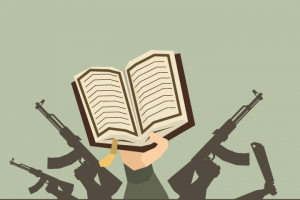Since the Prophet Muhammad’s time, there have been a number of extreme people in religion. One of those is Abdullah ibn Dzul-Khuwaishirah who dared to accuse the Prophet of being unfair and then demanded Him to uphold justice. Of course, because of his improper attitude, Umar ibn Khattab asked the Prophet for permission to behead him; but Umar was not permitted.
Abdullah ibn Dzul-Khuwaishirah is an example of a believer who is diligently and enthusiastically practicing religious teaching, but unfortunately is not based on adequate knowledge. This kind of people is prone of misguided despite their practice of Islam. Such people are resentful, full of anger and frequently accuse others as misguided, hypocrite, apostate, even infidel. Likewise, they are fond of harming others including fellow Muslim, moreover against non-Muslim. Indeed, their utterance and behavior have deviated from their own religion (Islam).
However, they do not realize it because of being lack of knowledge. Hence, they regard that they are always on the track of religious tenet. Ironically, they feel that they are the guardian of religion. It is clear that such people – who are over-enthusiastic in religion, yet on the other hand do not understand its main purpose – are always exist to the present.
They recite the Holy Quran but do not fully recognize what it actually means. Their shallow understanding of the Quran is frequently used as justification to harm others, especially to whom they dislike – out-group. Such people interpret the Quran by following their own interest and ambition, often put it on improper context.
All religion indeed has a number of extremist proponents. For example, in Islam, there are Muslims who do takfir easily. They are group of people who often stigmatize others with negative view and accuse them as kafir (infidel), only because of different views and practices.
Takfir thus becomes a foundation to the emergence of terrorism in the name of religion. In fact, takfir (accusing others as infidel) principally only an alibi, the first step before shedding the blood, seizing property and violating the honor of others. Likewise, in other cases, the extremist totally reject current nation-state system like republic, kingdom and so forth in which, for them, is categorized into dar harb (territory of war) or dar kufr (infidel terrotiory).
The other foundation of terrorism is based on hostility and struggle to take over the legal government. The extremists argue that the existing government is illegitimate according to Islamic legal jurisprudence. The current modern government systems are considered deviant from God’s law (Sharia) which is called as taghut, or enemy of religion. To seize the power, in many cases they murder numbers of citizens whom accused as an infidel and ironically this violent action is declared as Jihad; to the least they regard it as forbidding wrong (nahiy munkar) action.
For example, to legitimate their action, they often cited one hadith which is narrated by Sa’id al-Khudri as bellow;
(أفضل الجهاد كلمة حق عند سلطان جاءر ( أخرجه أبو داود والترمذي وقال حديث حسن )
An ultimate Jihad is the right statement to injustice leader (Narrated by Abu Daud and said as hadith Hasan)
Unfortunately, they seem to neglect the following hadith;
(من أراد أن ينصح لذي سلطان فلا يبده علانية ولكن يأخذ بيده ويخلو به فإن قبل منه فذاك وإلا كان قد أدى الذي عليه (رواه أحمد وابن أبي عاصم بإسناد صحيح
Whoever wants to advise those in power, then do not submit it openly (in public), but reach his hand and be alone with it. If the advice is accepted then that is (the advice), but if it is not accepted, then indeed he has conveyed his obligations. “(Narrated by Ahmad and Ibn Abi ‘Ashim with the Shahih sanad)
One of the most famous Muslim preacher, Al Syaukani commented on this hadith by saying:
ينبغي لمن ظهر له غلط الإمام في بعض المساءل أن يناصحه ولا يظهر الشناعة عليه على رؤوس الأشهاد بل كما ورد في الحديث أنه يأخذ بيده ويخلو به ويبذل له النصيحة ولا يذل سلطان الله. السيل الجرار المتدفق على حداءق الأزهر ج ٤ ص ٥٥٦
It is recommended for anyone who clearly see the mistake of the leader regarding some problems to advise him and do not embarrass him in front of the crowd, but as mentioned in the hadith, that he needs to hold his hand, take him to a quiet place and give him advice and not underestimate the authority of Allah. “
Nabawi Mosque Madinah,
Muharram 2nd, 1439 H.
Ahmad Ishomuddin, a member of General Advisory Board of Nahdlatul Ulama. Currently resides in Lampung, Indonesia.
Originally published in Islami.co: https://islami.co/dua-fondasi-radikalisme-dan-terorisme/
![Islami[dot]co](https://en.islami.co/wp-content/themes/jambualas/images/logo.png)
